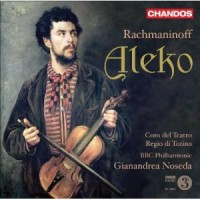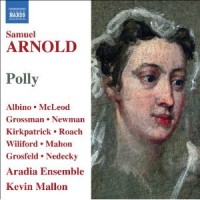Chandos has issued an excellent new CD
of Serge Rachmaninoff‘s one-act opera Aleko, written when the composer was only nineteen as a graduation exercise for the Moscow Conservatory.
Based on a poem by Pushkin, the opera is the tale of Aleko, a young man who flees society in search of the free life. He is taken in by Zemfira, a gypsy girl who bears him a child. Tragically, Zemfira grows bored with him and has an affair. Aleko surprises the lovers and kills them both in a jealous rage.
The story echoes Cavalleria rusticana at the beginning, with pastoral choruses about the gypsy life, a lovely Intermezzo, and an offstage cavatina by the Young Gypsy rhapsodizing about Zemfira. The tragic ending echoes Canio’s murder of Nedda and Silvio that ends Pagliacci. Still, the music has an unmistakably Russian sensibility, and a beautifully realized sense of impending doom in the score. The young Rachmaninoff has here written an opera of musical and emotional complexity that belies his years and has a remarkably mature feel.
Gianandrea Noseda leads the BBC Philharmonic in a powerful, emotionally varied reading of the score. Aleko is divided into thirteen distinct scenes without much transition music between them, but Noseda does a splendid job of making the score appear seamless, handling abrupt stylistic shifts from scene to scene with easy grace. The Coro del Teatro Regio di Torino does a fine, precise job with the numerous Gypsy Choruses.
The singing of the principals is a mixed bag. Baritone Sergey Murzaev shines in the title role, particularly in the haunting, beautifully shaded Cavatina of Aleko that is the emotional core of the opera. The booming bass of Gennady Bezzubenkov as the Old Gypsy (Zemfira’s father) contributes real depth to his story of his own betrayal by his wife that begins the piece; he is equally fine in the moving final scene.
Svetla Vassileva‘s Zemfira is fiery and passionate, but turns squally on her top notes and her rather thick soprano feels too matronly for the role. As her lover the Young Gypsy, tenor Evgeny Akimov does some ravishing singing, but emotional moments find him bleating a bit. The highlight of his performance is the final note as he dies, a high falsetto that slowly descends. The effect is ghostly and chilling.
I would very much like to see this piece staged with more frequency. At only 51 minutes long, it would make a fascinating pairing with either Cav or Pag.
No such hurry for Johann Christian Pepusch‘s 1729 ballad opera Polly. Written as a sequel to the enormously successful The Beggar’s Opera, this Polly never made it to the stage due to government censorship of the libretto’s satirical content. It was not until 1777 that Polly appeared at the Haymarket Little Theatre in a cut version of the text by George Colman The Elder and a score composed and arranged by Dr. Samuel Arnold.
In 2008, Polly was recorded in Toronto with a cast of young Canadian singers working with the Aradia Ensemble under Kevin Mallon, and it is currently available as a single CD from Naxos. Unfortunately, this recording has little to recommend it.
The fundamental and catastrophic problem is that the English text, so vital to the ballad structure, is virtually incomprehensible as sung here. The diction of the young singers is extremely poor—one can understand maybe every fifth word or so—and there is a particular lack of clarity in plosive consonants at the ends of words. The results leave the listener very frustrated. There may also be an engineering problem here: are the singers too close to the microphone, or is it that the balance between ensemble and singers is slightly off?
Dr. Arnold’s music stays very much in the style of Pepusch’s original score. The charming overture is a medley of tunes from The Beggar’s Opera. Alas, many of the ballads sound alike, and the music is rather formulaic. The highlights for me are the two dance segments, Dances of the Pirates and Dances of The Indians; happily these tunes are inventive and delightful and the listener can stop trying to comprehend lyrics and focus on the playing of the Aradia Ensemble.
Pirates and Indians, you wonder? The convoluted plot of Polly finds our old friends Macheath, Polly Peachum, and Jenny Diver in the West Indies, where Macheath has been exiled as a transported felon. Polly falls victim to the sex trade, but escapes in male disguise to continue the search for Macheath, who himself is disguised (in blackface!) as Morano, a pirate. Eventually, Macheath is killed in a battle between militia and the pirate rebels, and the grieving Polly finds comfort the arms of the Indian Prince Cawwawkee.
The voices are pleasant but undistinguished, with the men more successful than the women. I particularly enjoyed the honeyed dark tones of baritone Jason Nedecky as Ducat and bass Matthew Grosfeld as Morano/Macheath. Mallon keeps the Aradia Ensemble sounding bright and chipper throughout.
Anyone interested in Polly in this recording should be sure to have a copy of the text handy. I kept wishing for supertitles to appear in my living room.





